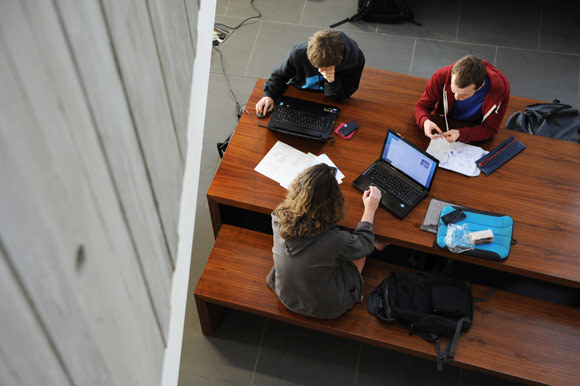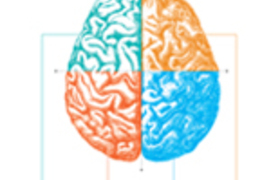When 'teaching or research' becomes 'teaching and research'
10 January 2014
How is UCT integrating teaching with its drive to become more research-intensive? Shanali Govender from the Centre for Innovation in Learning and Teaching reflects on the demands of balancing teaching and research activities at UCT.
In a recent interview, Craig Calhoun, director and president of the London School of Economics and Political Science, surfaces the perennial tension within higher education between research work and teaching. Calhoun argues that "part of what we should be struggling for in the reinvention of the university is an 'education first' understanding of it".
While many universities continue to struggle with reconciling the demands of research and teaching activities, there is little doubt that an integrated focus on these pillars of university life is central to the work of most UCT academics. From the university's most formal documents to the lived life of the university, it is clear that relevance and success on this campus is increasingly strongly related to knowledge creation and dissemination. Excitingly, this dissemination is characterised on paper, and increasingly in lived experiences, by an emphasis on openness in the widest sense, and on ongoing learning.
From mission statement to strategic plan, research is seldom mentioned without teaching. And in those instances where research is mentioned alone, it is almost inevitably followed by words such as 'dissemination', 'networking', and 'impact', making clear that for research to be useful, it must move through society. Indeed, if not specifically taught, research must at least be shared in the service of learning.
In a recent Senate meeting, the draft of UCT's Research Strategy was shared for comment. Point 9 states:
We recognise that our plans to improve our research performance must be constructed in such a way that they are fully consistent with the teaching and learning mission of the university and affirm the necessity for differentiated expectations with regard to the research and teaching performance of individual staff members in order to deliver most efficiently on both goals. Neither research nor teaching should be rewarded to the detriment of the other.
The draft Research Strategy also addresses the term 'research-led', arguing that it undervalues the teaching and learning functions of the university. Drawing on Gerhard Casper's description of a research-intensive institution, the draft Research Strategy emphasises that research, teaching and learning are mutually dependent in the context of higher education, asserting, 'This is how UCT sees itself.'
The extent of institutional support
No matter how fascinating, documents only tell part of a story. A key marker for the state of teaching and learning at UCT is the extent of institutional support in terms of people, money and facilities that are made available. The creation of a deputy vice-chancellor position focused on strategic issues, specifically teaching and learning, in January 2012 points to institutional support. Similarly, the establishment of a Senate-level teaching and learning committee and seven reporting sub-committees brings into focus the academic governance of teaching and learning. An increased focus on the importance of teaching activities for promotion, including the establishment of an academic teaching-rich track and various teaching grants, is further evidence of a university intent on entrenching teaching at the heart of its activities.
The various teaching grants supported by the university indicate support for innovative teaching activities in material ways. When we consider the additional range of support services offered through CHED (the Centre for Higher Education Development), it becomes clear that while teaching voices may struggle to be heard in other institutions, at UCT, these voices hold key positions on the stage.
The place where teaching is either most clearly valued or side-lined is in the offices and classrooms of the staff of UCT. Not all of us have the pleasure of observing our colleagues at work on a frequent basis. What we do have is a wonderful opportunity to peep into their classes via the annual UCT Teaching and Learning Conference - an invaluable opportunity to take the temperature of teaching and learning across UCT.
2014 Teaching and Learning Conference
Held every October for the last four years, the UCT Teaching and Learning Conference is being hosted this year in the Kramer Building on middle campus on Monday 20 October. While academic conferences have something of a reputation for being serious affairs, this conference is fundamentally a celebration of the kinds of innovative and responsive teaching work being done by UCT staff. We're thrilled by the record number of conference submissions from every faculty. Presenters range from assistant lecturers to professors - all enthused by teaching and learning either as formal research, or reflective practice, or some wonderfully generative combination of the two. Many presentations are offered by departmental or interdepartmental teams. This collaborative focus on teaching practices points to the communal and interdisciplinary nature of teaching at UCT. Such a willingness to open ourselves up as teachers (and researchers of teaching) to communal scrutiny can only bode well.
This year there are staff members talking about learning at a theoretical level; about language and how it functions in UCT classrooms; about curriculum shift and its consequences for shaping the people we help to make; about technological innovations and how these can change our students' experiences of learning; and about matters of social responsiveness.
Building on previous years, the conference has invited some alternative formats, so, in addition to more formal presentations, we have several panel presentations and a number of workshops during the day. Teas and lunches provide a generous opportunity for conference attendees to network, study the poster presentations, or browse the innovation fair. The innovation fair hosts stands from various internal and external support structures, and representatives will be available during teas and lunches to answer questions or set up meetings for further discussion.
For conference details, head to cilt.uct.ac.za, and follow @CILT_UCT and #TLC2014.
 This work is licensed under a Creative Commons Attribution-NoDerivatives 4.0 International License.
This work is licensed under a Creative Commons Attribution-NoDerivatives 4.0 International License.
Please view the republishing articles page for more information.
Books
Opinions
Focus
Previous Editions










